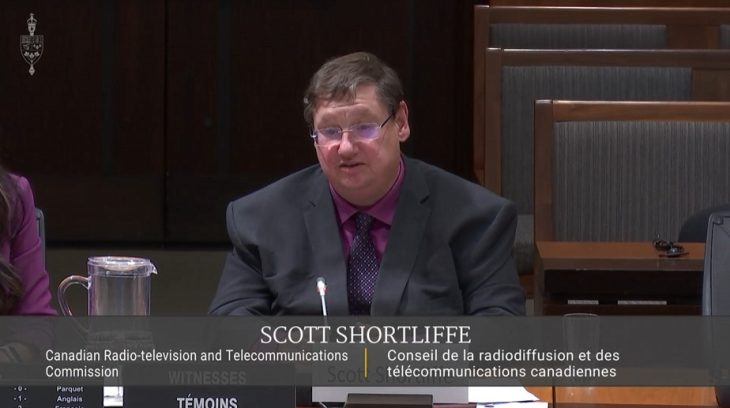
By Ahmad Hathout
The CRTC’s vice president of broadcasting said Wednesday that some of the base contribution money collected from online streamers, which is to be delivered to Canadian content funds, has already been released, despite a court-ordered stay of that policy.
Scott Shortliffe told the Standing Committee on Canadian Heritage, in a briefing about the implementation of the Online Streaming Act, that the streamers’ money from the previous broadcast year – which ended on August 31 – has been collected by an independent company and that some of the money has already been delivered.
“We understand that the money has been received in trust and is being held, and, in fact, we have been told that, at the choice of the streamers, some has actually been distributed to some of the recipients,” Shortliffe said Wednesday. “They are not legally required to do that; they have chosen to do so.”
Major foreign streamers last year filed applications at the Federal Court of Appeal challenging the CRTC’s decision to force them to contribute five per cent of their previous year’s Canadian revenues into content funds as part of the legislation to regulate them. In December, the court granted a stay of the policy and a hearing, which was held this summer.
A decision from the court is still pending, meaning the stay has not been lifted.
Shortliffe said the streamers (Apple, the Motion Picture Association – Canada, Google, and Roku) had asked – and the CRTC decided as part of the base contribution decision to allow – that an independent entity, not the regulator, hold their funds to maintain confidentiality of financial information. That means the CRTC is also in the dark and will not know how much money has been collected and how much has been delivered until the court makes a decision on the merits of the streamers’ arguments, which range from the regulator allegedly not factoring their existing contributions to the Canadian system to forcing them to fund news that they do not make or benefit from.
When that court decision is made, the CRTC is expected to get a report about how much is held and how much will be delivered, which the commission expects to be somewhere in the area of $200 million.
As for the workload, CRTC Chair Vicky Eatrides said Wednesday that the CRTC got temporary funding to hire 60 people to help the regulator get through the implementation of the Online Streaming Act, but that funding will disappear next year – when the commission expects to fully implement the new Broadcasting Act.
Cartt reported last month that the CRTC, which warned of a delay in implementation of the new legislation, had asked but was denied a reprofiling request to inject it with money to move quickly on the new rules.
The regulator told us it was given temporary funding in 2024-2025 “for additional resources to accelerate the implementation” of the new rules, and was also extended $5.8 million in 2025-2026 to “expedite” them.
The commission had been asked by government and was targeting implementing the legislation within two years through a series of consultations in what Eatrides called an “ambitious regulatory plan.” But that goal was pushed back by at least a year.
Scott Shortliffe, the CRTC’s vice president of broadcasting, on Wednesday, Oct. 1, 2025


